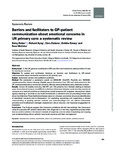Barriers and facilitators to GP–patient communication about emotional concerns in UK primary care: a systematic review
| dc.contributor.author | Parker, D | |
| dc.contributor.author | Byng, Richard | |
| dc.contributor.author | Dickens, C | |
| dc.contributor.author | Kinsey, D | |
| dc.contributor.author | McCabe, R | |
| dc.date.accessioned | 2021-11-05T10:29:39Z | |
| dc.date.available | 2021-11-05T10:29:39Z | |
| dc.date.issued | 2020-08-01 | |
| dc.identifier.issn | 0263-2136 | |
| dc.identifier.issn | 1460-2229 | |
| dc.identifier.uri | http://hdl.handle.net/10026.1/18220 | |
| dc.description.abstract |
<jats:title>Abstract</jats:title><jats:sec><jats:title>Background</jats:title><jats:p>In the UK, general practitioners (GPs) are the most commonly used providers of care for emotional concerns.</jats:p></jats:sec><jats:sec><jats:title>Objective</jats:title><jats:p>To update and synthesize literature on barriers and facilitators to GP–patient communication about emotional concerns in UK primary care.</jats:p></jats:sec><jats:sec><jats:title>Design</jats:title><jats:p>Systematic review and qualitative synthesis.</jats:p></jats:sec><jats:sec><jats:title>Method</jats:title><jats:p>We conducted a systematic search on MEDLINE (OvidSP), PsycInfo and EMBASE, supplemented by citation chasing. Eligible papers focused on how GPs and adult patients in the UK communicated about emotional concerns. Results were synthesized using thematic analysis.</jats:p></jats:sec><jats:sec><jats:title>Results</jats:title><jats:p>Across 30 studies involving 342 GPs and 720 patients, four themes relating to barriers were: (i) emotional concerns are difficult to disclose; (ii) tension between understanding emotional concerns as a medical condition or arising from social stressors; (iii) unspoken assumptions about agency resulting in too little or too much involvement in decisions and (iv) providing limited care driven by little time. Three facilitative themes were: (v) a human connection improves identification of emotional concerns and is therapeutic; (vi) exploring, explaining and negotiating a shared understanding or guiding patients towards new understandings and (vii) upfront information provision and involvement manages expectations about recovery and improves engagement in treatment.</jats:p></jats:sec><jats:sec><jats:title>Conclusion</jats:title><jats:p>The findings suggest that treatment guidelines should acknowledge: the therapeutic value of a positive GP–patient relationship; that diagnosis is a two-way negotiated process rather than an activity strictly in the doctor’s domain of expertise; and the value of exploring and shaping new understandings about patients’ emotional concerns and their management.</jats:p></jats:sec> | |
| dc.format.extent | 434-444 | |
| dc.format.medium | ||
| dc.language | en | |
| dc.language.iso | en | |
| dc.publisher | Oxford University Press | |
| dc.subject | Communication | |
| dc.subject | emotions | |
| dc.subject | mental health | |
| dc.subject | primary care | |
| dc.subject | professional-patient relations | |
| dc.subject | qualitative research | |
| dc.title | Barriers and facilitators to GP–patient communication about emotional concerns in UK primary care: a systematic review | |
| dc.type | journal-article | |
| dc.type | Journal Article | |
| dc.type | Research Support, Non-U.S. Gov't | |
| dc.type | Systematic Review | |
| plymouth.author-url | https://www.webofscience.com/api/gateway?GWVersion=2&SrcApp=PARTNER_APP&SrcAuth=LinksAMR&KeyUT=WOS:000607071800002&DestLinkType=FullRecord&DestApp=ALL_WOS&UsrCustomerID=11bb513d99f797142bcfeffcc58ea008 | |
| plymouth.issue | 4 | |
| plymouth.volume | 37 | |
| plymouth.publication-status | Published | |
| plymouth.journal | Family Practice | |
| dc.identifier.doi | 10.1093/fampra/cmaa002 | |
| plymouth.organisational-group | /Plymouth | |
| plymouth.organisational-group | /Plymouth/Faculty of Health | |
| plymouth.organisational-group | /Plymouth/Faculty of Health/Peninsula Medical School | |
| plymouth.organisational-group | /Plymouth/REF 2021 Researchers by UoA | |
| plymouth.organisational-group | /Plymouth/REF 2021 Researchers by UoA/UoA03 Allied Health Professions, Dentistry, Nursing and Pharmacy | |
| plymouth.organisational-group | /Plymouth/Research Groups | |
| plymouth.organisational-group | /Plymouth/Research Groups/FoH - Community and Primary Care | |
| plymouth.organisational-group | /Plymouth/Research Groups/Institute of Health and Community | |
| plymouth.organisational-group | /Plymouth/Research Groups/Institute of Translational and Stratified Medicine (ITSMED) | |
| plymouth.organisational-group | /Plymouth/Research Groups/Institute of Translational and Stratified Medicine (ITSMED)/CCT&PS | |
| plymouth.organisational-group | /Plymouth/Research Groups/Plymouth Institute of Health and Care Research (PIHR) | |
| plymouth.organisational-group | /Plymouth/Users by role | |
| plymouth.organisational-group | /Plymouth/Users by role/Academics | |
| dc.publisher.place | England | |
| dcterms.dateAccepted | 2020-01-01 | |
| dc.rights.embargodate | 2021-11-6 | |
| dc.identifier.eissn | 1460-2229 | |
| dc.rights.embargoperiod | Not known | |
| rioxxterms.versionofrecord | 10.1093/fampra/cmaa002 | |
| rioxxterms.licenseref.uri | http://www.rioxx.net/licenses/all-rights-reserved | |
| rioxxterms.licenseref.startdate | 2020-08-01 | |
| rioxxterms.type | Journal Article/Review |


